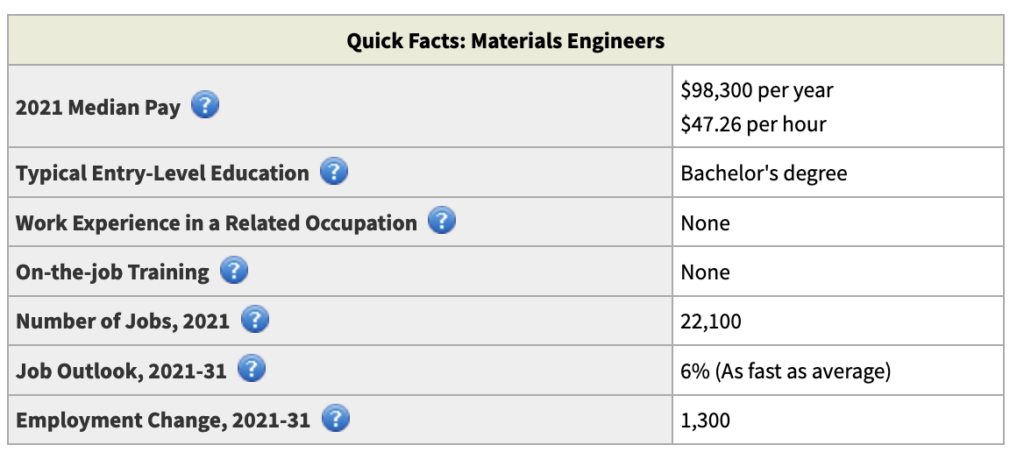What is material engineering?
It’s basically a form of engineering which is responsible for product development for all things material related.

A simple way to look at it is:
There’s a ton of varying metals, plastics, and composite materials that we use for products on a day to day basis.
When companies develop these products, they need to make sure that products are capable of withstanding operating conditions.
What material engineers do is that they ensure the products for the companies they work at are able to withstand what they’re in use for and in compliance with various specifications and standards within the engineering industry.
How to become a Materials Engineer
To be a Material Engineer or a Material Science Engineer, you will need a STEM degree (Science, Technology, Engineering, Math) from a University.
Either get into University straight from high school or transfer from community college, the choice is yours.
Throughout your academic career as a student, you need to make sure you have:
- Good grades
- Internships
- Participation in student organizations
- Projects
- A well written resume to apply to jobs
How to get good grades as a Material Engineering student
As a materials engineering student, you’re going to be taking a large amount of math and science classes such as:
- Physics
- Chemistry
- Mechanics of Materials
- Calculus
- Thermodynamics
- Statics
- Dynamics
And many other challenging engineering courses.
To do well in these courses, you’re going to need to establish good study habits.
Take advantage of resources such as university office hours, YouTube tutorials, deep work sessions, and learn how to study efficiently.
The keyword “efficiently” cannot be stressed enough.
Check out: 9 Tips On How To Be More Productive As A Student
How to get Internships as a Materials Engineer
To get internships as a Materials Engineer or a Material Science Engineer, you will also need the same things that you need to get an entry level job in the industry.
Good grades, strong involvement in student organizations, projects, and a well written resume will be how you get an internship in materials engineering.
Check out: How To Get An Engineering Internship With No Experience
Best Organizations to join as a Materials Engineer
Some of the best material engineering organizations to join are:
- Materials Research Society
- Society of Automotive Engineers
- American Society of Mechanical Engineers
- Society for Mining, Metallurgy, and Exploration (SME)
- The Minerals, Metals and Materials Society (TMS)
Best Projects to have as a Materials Engineer
Projects are a must have on your resume if you are low on experience and are looking to get a job as a Material Engineer.
You’ll need to showcase specific projects such as demonstrating material engineering work on products and quantifiable results and metrics accomplished with them.
Showcase projects where you have performed material selection and the improvement of the performance of the engineering product that you were working on.
You will need to be able to talk about this in an interview.
How to interview as a Materials Engineer
When interviewing for jobs as a materials engineer, you will need to answer questions using the STAR framework.
You will be going through these following interviews for material engineering jobs at companies:
- HR Phone Screen
- Hiring Manager Interview
- Panel Interview with Team
Be prepared for all of these interview scenarios provided that they happen.
Interviews at companies will consist of a mix of behavioral and technical questions. Be prepared for both and make sure you practice as much as you can in your free time when you have interviews coming up.
Check out: 6 HR Phone Screening Questions You Must Know and 100 Job Interview Questions and Answers
How to write a resume for Materials Engineers
All of the above won’t mean anything if you don’t know how to write an effective resume.
A good resume consists of using:
- A clean one page format using Microsoft Word and saving as a PDF
- Clear and concise bulletpoints
- The use of keywords pertaining to material engineering jobs
- Quantitative results and accomplishments to highlight your business impact as a materials engineer
Use the standard format that we recommend and fill it out yourself. We have resume templates available for you to use as well.
Bulletpoints to use for Materials Engineering Resume
Here are some example points to use for your Materials Engineering Resume:
- Developed materials for use in engineering design of structures, systems, and subsystems which resulted in $X revenue or X% improvement
- Responsible for technical insight for strategic suppliers of $100M of metallics for large value accounts
- Performed material and failure analysis of components to support the production of $X in automotive systems
Check out: What is the best resume format?
Materials Engineer Salary Information

The median recorded pay for Materials Engineers was $98,300 per year with about 6% job outlook for growth per the Bureau of Labor Statistics. (Source)
We’d wager job growth at 6% to be pretty accurate with what we see over the years.
Product development will continue to require the use of Material Engineers to ensure that products can withstand their operating conditions given engineering input such as material selection.
Best companies to work for as a materials engineer
Exciting opportunities in Materials Engineers will be in industries such as Tech, Aerospace, or Robotics.
We see these 3 industries as some of the best industries to get into regarding engineering as they all utilize cutting edge technology and will continue to see growth and development within those respective systems.
The best companies to work for as a materials engineer include:
- Amazon
- Apple
- Boeing
- SpaceX
- Northrop Grumman
- Tesla
- Rivian
- and more
Material Engineering Job Example

See an example of a Material Engineering job description at Northrop Grumman.
You’ll notice that all of the essential duties and responsibilities pertain to all things associated with materials for material engineers.
You’ll see responsibilities ranging from the development and optimization of materials all the way down to responsibilities at the supply chain level.
Material Engineering Specifications you should be familiar with
Some standards Material Engineers should be familiar in the industry are:
- ANSI
- ASTM
- ISO
- IEEE

Many of these standards define what specific engineering requirements the product that you’re working on needs to meet as a materials engineer.
You’ll heavily rely on referring to these specs in your day to day to ensure compliance.
Closing Thoughts
Material Engineers are very important to ensure that the products we use on a day to day basis can withstand what they’re subject to.
Things such as operating conditions, corrosion, and product lifecycle are some of the things that material engineers take into consideration throughout the design and development of a product.
There are lots of opportunities out there, especially in industries such as aerospace, tech, and robotics where there will be a need for material engineers.
About the author

Kazuyoshi Fujimoto, PE
Founder | Engineering Career Coach | Principal Mechanical Engineer
Kazu oversees all of ultmeche’s engineering services. He provides consulting such as resume reviews, rewrites, mock interviews, and all services career related. Additionally, Kazu performs consulting work regarding Oil & Gas, Automotive, and Aerospace & Defense. Kazu is licensed as a professional engineer in the state of California and has 9+ years of experience in Oil & Gas, Automotive, and Aerospace & Defense.

2 thoughts on “What is Material Engineering”